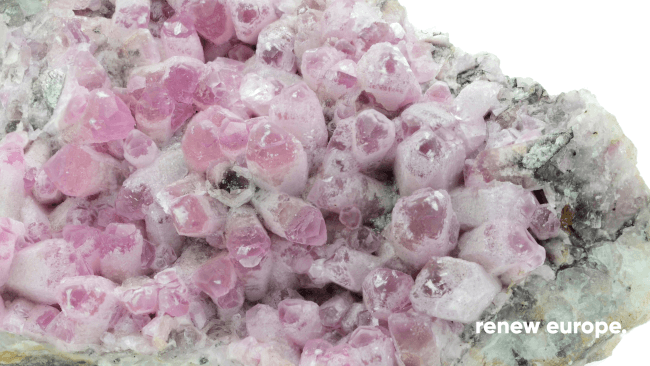Critical Raw Materials: Renew Europe sets out its priorities for secure, diversified, affordable and sustainable supplies
Author: Alberto Cuena Vilches
Date:

Critical raw materials are the lifeblood of our transition to a digital and green economy. They are indispensable for a wide set of strategic industries such as renewable energies, the technology sector, space, security and defence, and are present in elements of our daily lives such as smartphones and electric cars. At today´s meeting of the Industry, Research and Energy Committee (ITRE), Renew Europe MEP Nicola Beer, rapporteur for the file and Vice-President of the European Parliament, set out the starting point for a European critical raw materials strategy to reduce our strategic dependencies and to strengthen the EU's open strategic sovereignty in an increasingly volatile world economy.
As a staunch supporter of European industry and the twin green and digital transitions, Renew Europe advocates for addressing supply risks by strengthening and diversifying value chains with strategic trade alliances based on mutual benefits, where unilateral dependencies on third countries are left behind. It is also essential to boost investment in innovation and research to accompany the development of sustainable alternative materials and production methods on European soil and furthermore to foster refining and recycling capacities. Finally, the bureaucratic burden on companies should be lifted, by reduced reporting, facilitating easier access to finance and shorter approval procedures for strategic critical raw materials projects.
MEP Nicola Beer (FDP, Germany), Vice-President of the European Parliament and Rapporteur on the Critical Raw Materials Act, declared:
“With the EP's draft report on the Critical Raw Materials, Europe's sovereignty is no longer on shaky ground but on a solid foundation. The proposal accelerates towards European security of supply, with a research and innovation offensive for alternative materials and production methods along the entire value chain. It boosts companies, especially European SMEs - not through avalanches of subsidies, but by accelerating and simplifying approval processes, reducing bureaucratic hurdles and introducing risk guarantees. With targeted economic incentives for production and recycling in Europe as well as the expansion of strategic partnerships with third countries on an equal footing, the proposal paves the way for Europe's course towards open, economic and geopolitical sovereignty”.